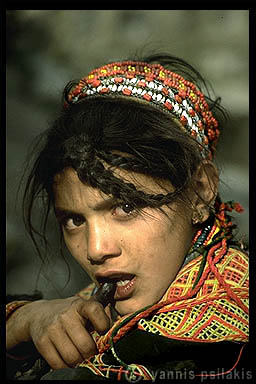|
|
||||
| Home
JUNE 2001- Contents Culture Sports Health Lifestyle Visual Arts People Travel & Adventure
|
|
|
||
|
the-south-asian.com June 2001 |
||||
|
Page 1 of 6
Problems of Minority Development and Environmental Management By Peter Parkes Department of Anthropology, University of Kent
"Kafiristan, the land of Kalash (in Chitral Valley of Pakistan), romanticised by the visiting foreign researchers and tourism promotion agencies in the country, has been fast moving towards the brink of bankruptcy. Contemporary accounts of the Kalasha - including ethnography, development prospectuses, and travel journalism - reiterate a handful of romantic motifs: mysterious 'Aryan' origins, or legendary Greek descent from Alexander the Great; ancient shamanic mysteries; prehistoric 'children of nature'; an arcadian 'lost world'. These familiar tropes of Shangri-la, earlier applied to the Afghan Kafirs or the Burusho of Hunza, are quite recent exotic configurations for the Kalasha. The Kalasha have suffered a surfeit of projects and programmes for their cultural protection or economic improvement. From a more detached anthropological perspective, for such indigenous minorities, perhaps all imposed development programmes unwittingly amplify - with indigenous connivance - the socially deleterious processes outlined in Douglas's pathological' depiction of an enclave culture."
"The main problem that we are facing right now are those actions taken above our heads, without asking the people: for example, when well-wishing foreigners create their own NGOs for the 'protection' of our people and our valleys... These outsiders just involve a few people [in their projects], so the rest of the people stay away. They just say: "There is an NGO at work, so why should we do anything for nothing?" Or when political groups [i.e. factions] are involved in a project, they say: "We don't belong to that party, so why should we do it?" So the unity is gone... in this way, the people stop working together. " - (Saifullah Jan 1995)
Saifullah Jan is an indigenous activist and spokesman for over three thousand non-Muslim Kalasha ('Kalash Kafirs') inhabiting three mountain valleys in the Chitral District of northern Pakistan. Criticizing several projects at a recent conference in Chitral for needlessly interfering with Kalasha religious culture, Saifullah Jan targeted a range of related 'well-wishing' programmes aimed at local education in the Kalasha language on topical issues of hygiene, local medicine, indigenous tradition, and environmental understanding. His wry rejoinder was again: "We don't need to be told what we already know ourselves! We don't need to be shown pictures of what we can see every day! We need no more NGOs!" The Kalasha have indeed suffered a surfeit of projects and programmes for their cultural protection or economic improvement, which have recently concentrated on issues of local environmental management. Focussing attention on imminent environmental catastrophe, Kalasha are typically represented in the promotional rhetoric of such NGOs as innocent and indeed childlike victims of outside exploiters. Kalasha leaders may endorse such diagnoses of environmental devastation being made on their behalf. But they are often more strategically preoccupied with prior questions of legal entitlement and the assertion of customary rights to control local resources. Beyond simply decrying a culture of dependency created by ill-conceived interventions, and far from dismissing all development encounters, their underlying preoccupation rather concerns the local organizational implications of such development schemes: their effects on communal 'unity' or 'disunity.' A barely euphemised implication is that development funding has long been insinuated with Kalasha factional politics, feeding into the competitive political ambitions of local leaders, while undermining their broader campaigns to wrest communal control of environmental resources. Saifullah Jan has himself been engaged in such a long-term struggle to mobilize collective support for Kalasha forest rights. His career therefore offers a privileged personal perspective on a relatively neglected issue of indigenous environmental knowledge: that is, how practical or habitual knowledge is variously transformed through adversarial debate into local environmental consciousness.
|
||||
| Copyright © 2000 [the-south-asian.com]. Intellectual Property. All rights reserved. | ||||
| Home |
